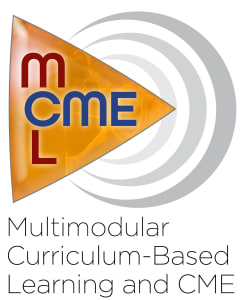The Role of Early Screening, Detection and Referral of Patients with Nonproliferative Diabetic Retinopathy (NPDR): The Evidence for Time-Sensitive, anti-VEGF Therapy for Preventing “Inevitable” Blindness in Persons with Diabetes

Program Medium
Internet-based program
Method of Physician Participation Utilized in Learning Process
There are no fees for participating and receiving CME credit for this activity. During the period March 7, 2021 through March 7, 2023, participants must 1) read the learning objectives and faculty disclosures; 2) study the educational activity, and are expected to view activity, totaling 0.5 hours, to successfully complete the activity and earn CME credit; 3) register and complete the evaluation form and post-test; 4) score 100% on the post-test; and 5) print out CME certificate.
Estimated Time to Complete Educational Activity
0.5 hours. Physicians must study the enduring activity, and are expected to view every segment to successfully complete the activity and earn CME credit.
Course Overview
In this web-based program, physicians will learn how recent developments in basic and clinical research have helped to advance the understanding of, screening for, and management of diabetic retinopathy in patients with Type 1 or Type 1 diabetes at risk for eye disease.
Release Date
March 7, 2021
Expiration Date
March 7, 2023
Intended Audience
This complimentary CME educational activity is designed for all healthcare providers (HCPs) involved in developing, delivering, consulting, and monitoring care for patients with type 1 or type 2 diabetes, at risk for developing diabetic-related eye disease, including optometrists, ophthalmologists, retinal specialists, diabetes specialists, endocrinologists, primary care physicians, and related clinicians.
Registration
Participation in this activity is complimentary, and clinicians are invited to view this CME-certified program and/or share this invitation with other colleagues, departmental staff members, and healthcare professionals.
Grantor Support
This activity is supported by an independent medical education grant from Regeneron.
Accreditation Statement
This activity has been planned and implemented in accordance with the Essential Areas and policies of the Accreditation Council for Continuing Medical Education (ACCME) through the joint providership of the University of Massachusetts Medical School and CMEducation Resources, LLC. The University of Massachusetts Medical School is accredited by the ACCME to provide continuing medical education for physicians.
Credit Designation Statement
The University of Massachusetts Medical School, Office of Continuing Medical Education designates this enduring material for a maximum of 0.5 AMA PRA Category 1 Credits(s)TM. Physicians should claim only the credit commensurate with the extent of their participation in the activity.
Policy on Faculty & Provider Disclosure
It is the policy of the University of Massachusetts Medical School to ensure fair balance, independence, objectivity and scientific rigor in all activities. All faculty participating in CME activities sponsored by the University of Massachusetts Medical School are required to present evidence-based data, identify and reference off-label product use and disclose all relevant financial relationships with those supporting the activity or others whose products or services are discussed. Faculty disclosure will be provided in the activity materials.
Program Faculty and Disclosure
Program Chair:
Rishi P. Singh, MD
Staff Physician, Cole Eye Institute
Cleveland Clinic Foundation
Associate Professor of Ophthalmology
Lerner College of Medicine
Case Western Reserve University
Cleveland, OH
Advisor or consultant: Alcon Laboratories Corp.; Bayer HealthCare; Genentech, Inc.; Novartis Pharmaceuticals Corporation; Regeneron Pharmaceuticals, Inc.; Roche
Research support: Apellis
Program Managers and Web Editor Disclosure
Program Managers Gideon Bosker, MD and Denise Leary have nothing to disclose.
Educational Objectives
Upon completion of this activity, participants will be able to:
- Understand and apply practical, case-based and guideline-consistent approaches to prompt, systematic referral to retinal specialists of appropriate patients with diabetic eye disease when screening persons with diabetes at risk for diabetic retinopathy, diabetic macular edema, and age-related macular degeneration.
- Outline clinical data and vision outcomes using intravitreal, anti-VEGF treatment approaches—vs. other approaches such as laser-based photocoagulation—for diabetic persons with early retinal findings of non-proliferative diabetic retinopathy;
- Explain why early referral for definitive intravitreal treatment can prevent visual deterioration, impede progression of DR, including blindness, in persons with diabetes;
- Screen for and recognize the retinal findings of diabetes-related eye disease—including early DR, DME, and AMD—and apply prompt, systematic referral strategies to retina specialists who can mitigate progression of DR, DME, and AMD;
- Apply optometry- and physician-focused screening methodologies—among them, in-office/in-clinic screening devices, evolving technologies for evaluation of retinal disease, dilated eye exams, telemedicine technology, optometrist- and physician-based screening and referral protocols—to optimize detection and referral to retina specialists for definitive treatment and prevention of progressive eye pathology and blindness;
- Outline the practical applications and quality-of-vision improvement and blindness prevention aspects of deploying anti-VEGF therapy in the optometry- and medical-based diabetic eye disease setting
Hardware and Software Requirements:
To participate in this program, viewers must have a PC or Macintosh computer that has active, ongoing internet access for the duration of the program, as well as a compatible Flash-viewer. An email address is required for registration, and a printer is required to print out the CME certificate.
Privacy Policy
When you participate in a CME activity offered by CMEducation Resources, we ask you for your name, degree, affiliation, street address, telephone number, fax number, and/or e-mail address (the "Information"). We use that Information in the following ways:
•We use the Information to grade your post-test and to send you a certificate of completion of the CME activity. If we use a third-party company to grade your post-test and issue certificates of completion, we will give the Information to that company for that purpose only.
•For each CME activity that you take, you must complete an evaluation questionnaire. That questionnaire asks if you are willing to participate in a follow-up survey. If you answer yes, we will use your name and contact information to send you the survey.
•We may use the Information to send you information about other CME activities that CMEducation Resources is offering.
•If our company is acquired by or merged into another company, we may make the Information available to the new owner/entity to use in the ways described above, to enable it to continue our business.
•You should check this privacy policy periodically to see whether we have made any changes.
Disclaimer
Copyright © 2021 by CMEducation Resources, LLC All rights reserved.
Reproduction, distribution, or translation without express written permission is strictly prohibited.
Content on this webcast reflects the opinions, output, and analyses of experts, investigators, educators, and clinicians whose activities for, while independent, are commercially supported by the sponsor noted at the start of each activity.
Content on this webcast is not meant to be, nor substitute for national guidelines or recommendations generated by professional, academic societies, colleges, or associations.


